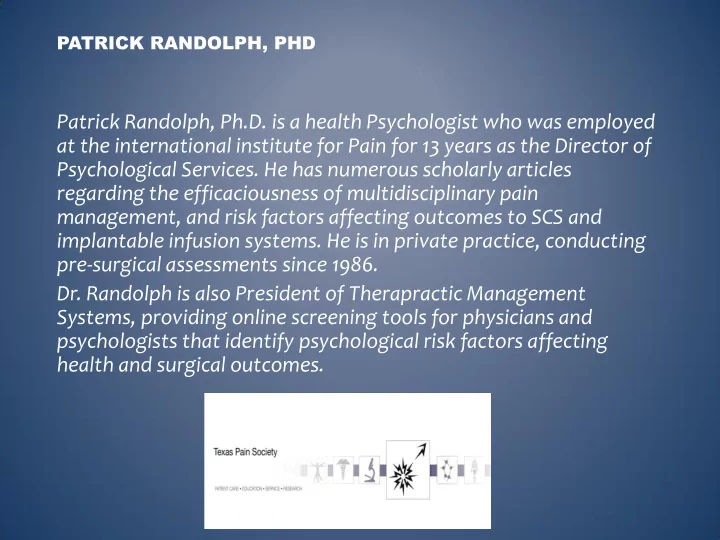

PATRICK RANDOLPH, PHD Patrick Randolph, Ph.D. is a health Psychologist who was employed at the international institute for Pain for 13 years as the Director of Psychological Services. He has numerous scholarly articles regarding the efficaciousness of multidisciplinary pain management, and risk factors affecting outcomes to SCS and implantable infusion systems. He is in private practice, conducting pre-surgical assessments since 1986. Dr. Randolph is also President of Therapractic Management Systems, providing online screening tools for physicians and psychologists that identify psychological risk factors affecting health and surgical outcomes.
PRESURGICAL SCREENING FOR IMPLANT TECHNOLOGY
PURPOSE PURP OSE – PRE PRESUR SURGICA GICAL PSYCH PS CHOL OLOG OGICA ICAL L SCREENING SCREENING • Improve overall surgical results • Avoid problem patients and litigation • Facilitate integrated care and outcomes • Prepare patient for surgery • Requirement of insurance • Patient education. • Run interference
PROCE PR OCESS SS OF OF PR PRES ESUR URGICA GICAL PSYCHOL PSY CHOLOGIC OGICAL AL SCR SCREENING EENING • Gather information from multiple sources • Empirically-based assessment • Answer referral question • Treatment suggestions
MEDICAL FACTORS • Older age • Longer pain duration • Metabolic syndrome • Number of previous spine surgeries • Aggressive treatments for many other health problems • High comorbid medical conditions
ENVIRONMENTAL FACTORS • Acute stressful life events • Stressful events before 13 • Vocational status • Social support
PSYCHOLOGICAL FACTORS • Depression • Somatization • Anxiety • Psychiatric comorbidity • Past history of mood disorder • Personality - Neuroticism • Childhood abuse or trauma
SUBS SUBSTANCE ANCE AB ABUSE/DE USE/DEPENDE PENDENCE NCE • Nicotine dependence • Alcohol abuse or dependence • Opioid abuse
COPING FACTORS • Pain tolerance/sensitivity • Catastrophizing • Low self-efficacy • Perception of pain-related disability • Frequent negative thoughts about pain
DECISIONAL A DECISION AL ALGORITHM GORITHM • Depression, somatization, anxiety and poor coping were most useful in predicting poor response to SCS • Severity of distress is the key • Multiple risk factors • No gold standard approach
HOW HO W TO O PR PREP EPAR ARE E A P A PATIEN TIENT T FO FOR R PSY PSYCHOL CHOLOGIC OGICAL AL ASS ASSESSME ESSMENT • Send medical records • Relay sensitive information orally • The Psychologist will do everything necessary to help move you forward, to include explaining why the assessment is important. It is normal to have distress. • Are you and the psychologist on the same page philosophically?
Recommend
More recommend